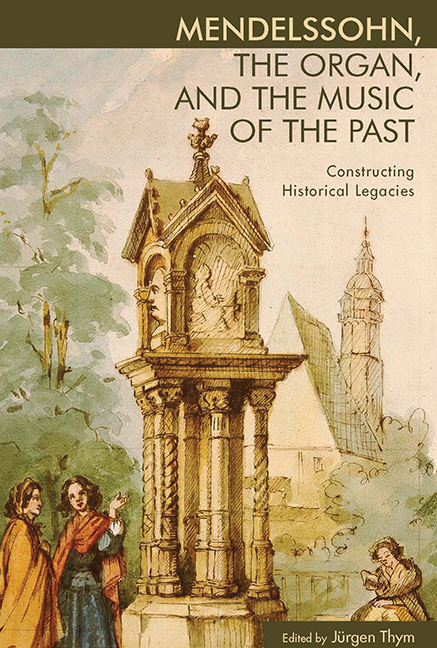Book contents
- Frontmatter
- Dedication
- Contents
- Acknowledgments
- Introduction: Of Statues and Monuments
- Part One Composition and Tradition
- Part Two Mendelssohn and the Organ
- 4 Mendelssohn and the Organ
- 5 Some Observations on Mendelssohn's Bach Recital
- 6 “He Ought to Have a Statue”: Mendelssohn, Gauntlett, and the English Organ Reform
- 7 Mendelssohn's Sonatas, Op. 65, and the Craighead-Saunders Organ at the Eastman School of Music: Aspects of Performance Practice and Context
- Part Three Mendelssohn's Inherited Legacies in Context
- List of Contributors
- Index
6 - “He Ought to Have a Statue”: Mendelssohn, Gauntlett, and the English Organ Reform
from Part Two - Mendelssohn and the Organ
Published online by Cambridge University Press: 14 March 2018
- Frontmatter
- Dedication
- Contents
- Acknowledgments
- Introduction: Of Statues and Monuments
- Part One Composition and Tradition
- Part Two Mendelssohn and the Organ
- 4 Mendelssohn and the Organ
- 5 Some Observations on Mendelssohn's Bach Recital
- 6 “He Ought to Have a Statue”: Mendelssohn, Gauntlett, and the English Organ Reform
- 7 Mendelssohn's Sonatas, Op. 65, and the Craighead-Saunders Organ at the Eastman School of Music: Aspects of Performance Practice and Context
- Part Three Mendelssohn's Inherited Legacies in Context
- List of Contributors
- Index
Summary
The reception of the oratorio Elijah (MWV A25, op. 70) at the Birmingham Musical Festival in 1846 is a well-rehearsed episode in Mendelssohn biography. Writing to his brother Paul, the composer commented, “No work of mine ever went so admirably at the first time of its execution,” and this impression is largely confirmed by contemporary reviews in the English press. Charles Gruneisen, music critic of the Morning Chronicle, a friend of Meyerbeer and (later) one of the first English critics to champion Wagner, penned a lengthy and ecstatic review, which included the following passage:
The execution of the new oratorio exacts unbounded eulogium [sic]. Never was there a greater anxiety to do justice to a composer. Every individual in the orchestra, instrumentalist or vocalist, made the same exertions as if individual fame was at stake. There was not a single hitch; slight blemishes there might have been to the initiated, but the audience could distinguish nothing but the universal desire to accomplish a labour of love.... The light and shade were accurately observed, and from the masses in action a real pianissimo was actually obtained. The band never was more effective.
Then, to this catalog of superlatives, he adds, “It was also advantageous to have a first-rate organist like Dr. GAUNTLETT on such an occasion.” Gauntlett was Mendelssohn's choice as organist. Because the organ keys were placed eighteen feet in front of the organ case, and immediately below the conductor's rostrum, Gauntlett sat literally (as well as metaphorically) at the composer's feet, with the instrumentalists seated on rising tiers behind the console and the singers to either side; it was a common arrangement in English musical festivals of the period.
For the organist, it was far from ideal. Unable to see the conductor except through the agency of a mirror, he was surrounded by instrumentalists and singers, and had to grapple with the heavy key touch (so heavy that Mendelssohn declined to play at the 1846 festival) and stop actions that, according to the resident organist, required “the force of a steam engine” to operate. But this was not the end of Gauntlett's troubles at the first performance of Elijah. Somehow, the organ part had been lost, and hence he was obliged to play from the full score, “which he did,” nineteenth-century writers tell us, “to the composer's entire satisfaction.”
- Type
- Chapter
- Information
- Mendelssohn, the Organ, and the Music of the PastConstructing Historical Legacies, pp. 122 - 140Publisher: Boydell & BrewerPrint publication year: 2014

